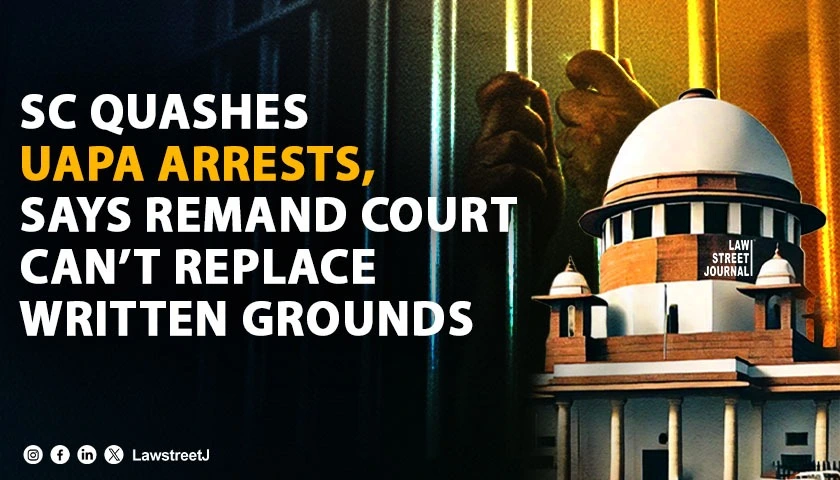New Delhi: The Supreme Court has quashed the arrest and remand of three individuals booked under the Unlawful Activities (Prevention) Act (UAPA) and the Indian Penal Code, holding that the mandatory requirement of furnishing written grounds of arrest was not complied with, and that an explanation by the remand court cannot substitute for it.
A bench comprising Justice M.M. Sundresh and Justice Vipul M. Pancholi made these observations while allowing Criminal Appeal No. 4505/2025 arising out of SLP (Crl.) No. 198/2025 filed by Ahmed Mansoor and others.
The appellants were charged with offences under Sections 153A, 153B, 120B, and 34 of the Indian Penal Code, 1860, and Sections 13 and 18 of the UAPA.
The only issue for consideration was whether the appellants were furnished with the grounds of arrest when apprehended and, if not, whether the explanation given by the jurisdictional court at the time of remand, followed by a remand order indicating that the grounds were explained, would sufficiently comply with Section 43B of the UAPA.
On facts, there was no dispute that the grounds of arrest were not furnished either to the appellants or to the persons arrested with them. The respondents’ sole contention was that the grounds were explained by the court at the time of remand, followed by furnishing a copy to the counsel who appeared with them.
The Supreme Court held that the High Court had misconstrued earlier judgments. The bench extensively relied on Pankaj Bansal v. Union of India (2024) 7 SCC 576, which held:
“To give true meaning and purpose to the constitutional and statutory mandate of Section 19(1) of the PMLA of informing the arrested person of the grounds of arrest, we hold that it would be necessary, henceforth, that a copy of such written grounds of arrest is furnished to the arrested person as a matter of course and without exception.”
The Pankaj Bansal judgment further clarified that merely reading out or permitting reading of the grounds of arrest is not adequate to fulfil compliance with Article 22(1) of the Constitution, and such an arrest cannot be sustained.
The Court also relied on Prabir Purkayastha v. State (NCT of Delhi) (2024) 8 SCC 254, which held:
“Once this Court has interpreted the provisions of the statute in the context of the constitutional scheme and has laid down that the grounds of arrest have to be conveyed to the accused in writing expeditiously, the said ratio becomes the law of the land binding on all courts in the country by virtue of Article 141 of the Constitution.”
Significantly, the Prabir Purkayastha judgment distinguished between “reasons for arrest” and “grounds of arrest,” stating that reasons indicated in arrest memos are purely formal parameters applicable to any arrested person, whereas “grounds of arrest” must contain details necessitating the arrest, be personal to the accused, and convey all basic facts enabling the person to defend against custodial remand and seek bail.
The Supreme Court further relied on Vihaan Kumar v. State of Haryana, wherein it was held that:
“The purpose of communicating the grounds of arrest to the detenu, and in addition to his relatives, is not merely a formality but to enable the detained person to know the reasons for his arrest and to provide the necessary opportunity to him through his relatives, friends, or nominated persons to secure his release at the earliest possible opportunity, thereby actualising the fundamental right to liberty and life as guaranteed under Article 21 of the Constitution.”
The respondents’ counsel placed reliance on recent decisions in Kasireddy Upender Reddy v. State of Andhra Pradesh (Criminal Appeal No. 2808/2025, decided on May 23, 2025) and State of Karnataka v. Sri Darshan (Criminal Appeal Nos. 3528–3534/2025, decided on August 14, 2025).
However, the Supreme Court distinguished these cases, noting that State of Karnataka v. Sri Darshan dealt with cancellation of bail where a chargesheet had been filed and the grounds were served immediately, and that judgment actually approved the decision in Vihaan Kumar. Similarly, Kasireddy Upender Reddy also reiterated the law laid down in Vihaan Kumar.
Therefore, the Court held:
“We are inclined to hold that the present appeal deserves to succeed only on the ground that the mandate of furnishing the grounds of arrest at the time of securing the appellants has not been complied with.”
Crucially, the Court emphasized:
“Suffice it to state that the explanation by the Court before whom the arrestees are produced can never be an adequate compliance of furnishing the grounds of arrest at the time of securing an accused.”
Accordingly, the Court set aside the High Court order and consequently quashed the arrest and remand orders, while granting liberty to the respondents to take recourse to law for arrest if a case is made out. The Court clarified that it was not going into the merits of the case.
Mr. A. Velan appeared as AOR with Navpreet Kaur, Mr. Prince Singh, Mr. Abdul Basith, Mr. Nilay Rai, and Ms. Kanika Sharma for the petitioners. Mr. Raja Thakare, ASG, and Mr. G. Siddi Ramulu, Senior Advocate, with Mr. Rohit Khare, Ms. Tusharika Sharma, Ms. Adya Jha, Mr. Adarsh Kumar Pandey, and Mr. Arvind Kumar Sharma (AOR), appeared for the respondents.
Case Title: Ahmed Mansoor & Ors. v. The State Rep. by Assistant Commissioner of Police & Anr.











